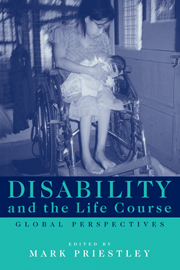Book contents
- Frontmatter
- Contents
- List of figures
- List of tables
- Notes on contributors
- Preface
- Acknowledgements
- A brief note on terminology
- I Concepts
- II Methods and stories
- 6 Life event histories and the US independent living movement
- 7 A journey of discovery
- 8 Using life story narratives to understand disability and identity in South Africa
- 9 Social change and self-empowerment: stories of disabled people in Russia
- 10 Lifting the Iron Curtain
- 11 Revisiting deaf transitions
- 12 The hidden injuries of ‘a slight limp’
- III The politics of transition
- Index
9 - Social change and self-empowerment: stories of disabled people in Russia
Published online by Cambridge University Press: 30 September 2009
- Frontmatter
- Contents
- List of figures
- List of tables
- Notes on contributors
- Preface
- Acknowledgements
- A brief note on terminology
- I Concepts
- II Methods and stories
- 6 Life event histories and the US independent living movement
- 7 A journey of discovery
- 8 Using life story narratives to understand disability and identity in South Africa
- 9 Social change and self-empowerment: stories of disabled people in Russia
- 10 Lifting the Iron Curtain
- 11 Revisiting deaf transitions
- 12 The hidden injuries of ‘a slight limp’
- III The politics of transition
- Index
Summary
It is necessary to be skilled in falling to be able to stand up and move further.
(Yuri Nikolaevitch Kazakov)The purpose of this chapter is to explore the subjective dimension of Russian women's and men's experience of living with disability in Soviet and post-Soviet times, and to assess the significance of these memories for current constructions of disability and identity. In my earlier writings on issues surrounding disability in Russia, I focused on the experiences of families rearing a disabled child, on the barriers and limits in the social location of such a family and their children (Iarskia-Smirnova 1997). Addressing the contemporary politics of social exclusion and its institutionalisation, through an analysis of interviews with Russian mothers of disabled children, I have looked at how gender stereotypes, insufficient services and discriminatory social attitudes frustrate efforts to develop social tolerance, inclusion, and the participation of disabled children and their families in contemporary Russian society (Iarskia-Smirnova 1999a, 1999b).
Recently, it has become increasingly evident to me that the needs-and-resources analysis of disabled children and their families ‘in terms of living with impairment per se (that is, in terms of a medicalised discourse of the difficult “personal” consequences of being ill or impaired)’ (Thomas 1999: 47), needs to be balanced with the enabling aspects of resistance and success in the lives of disabled adults, in terms of disability as socially constructed phenomena (Oliver 1990).
- Type
- Chapter
- Information
- Disability and the Life CourseGlobal Perspectives, pp. 101 - 112Publisher: Cambridge University PressPrint publication year: 2001
- 3
- Cited by



